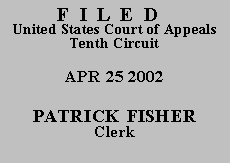

| UNITED STATES OF AMERICA, | No. 01-6387
(D.C. No. 01-CR-118-R) |
The incident giving rise to Johnson's conviction involved his failure to cooperate with Sergeant Straughn when he attempted to escort Johnson off Tinker Air Force Base. Johnson reported to work on November 16, 2000, but did not perform any of his duties. When informed by his supervisor, Mr. Watson, that he was "off the clock" until he agreed to work, Johnson and Watson got into an argument and Watson asked Johnson to leave. Johnson refused, and Watson called Air Force Security Forces to come and assist him in getting Johnson to leave. Sgt. Straughn arrived and attempted to get Johnson to leave. Throughout this entire process, Johnson was uncooperative and eventually had to be hand-cuffed.
On appeal, Johnson challenges the sufficiency of the evidence supporting his conviction. He made a similar argument to the district court judge, who rejected it and affirmed the magistrate judge's decision.(2) We review challenges to the sufficiency of the evidence in a light most favorable to the government and ask whether any rational trier of fact could have found the essential elements of the crime, which in this case are willfulness and obstruction, beyond a reasonable doubt. See United States v. Holder, 256 F.3d 959, 966 (10th Cir. 2001).
Our review of the record indicates that there is evidence, when viewed in a light most favorable to the government, from which reasonable jurors could find that Johnson willfully obstructed a security officer in the discharge of his duties beyond a reasonable doubt. Johnson refused to comply with Sgt. Straughn's instruction to leave the base, he impeded Sgt. Straughn's efforts to handcuff him, and initially resisted Sgt. Straughn's efforts to place him in Sgt. Straughn's vehicle. We therefore reject Johnson's sufficiency of the evidence claim and AFFIRM the district court's decision.
ENTERED FOR THE COURT
David M. Ebel
Circuit Judge
*.After examining appellant's brief and the appellate record, this panel has determined unanimously that oral argument would not materially assist the determination of this appeal. See Fed. R. App. P. 34(a)(2) and 10th Cir. R. 34.1(G). The case is therefore ordered submitted without oral argument. This Order and Judgment is not binding precedent, except under the doctrines of law of the case, res judicata, and collateral estoppel. The court generally disfavors the citation of orders and judgments; nevertheless, an order and judgment may be cited under the terms and conditions of 10th Cir. R. 36.3.
1. The violation of the Oklahoma statute was assimilated as a federal crime pursuant to 18 U.S.C. § 13, as it occurred on Tinker Air Force Base.
2. Johnson's case was first heard before a magistrate judge, before he appealed his conviction to the district court. (ROA at 15.)